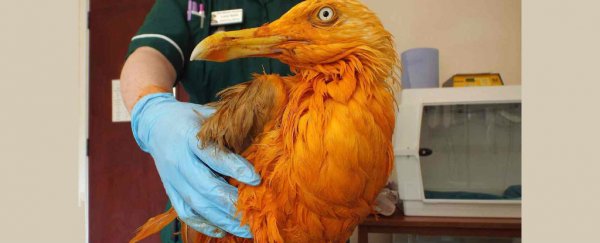There are two types of people in this world: those who think seagulls are dirty scavengers who steal too many ice creams and Doritos, and those who think seagulls are legit the best birds ever because they've managed to adapt to modern life like total champs.
But even the most fervent seagull supporters have to admit that the sad orange bird above got what was coming to it. Or maybe it took one for the team as recompense for this. And this. And this, because it hurts our eyes.
Turns out, this sorry individual was trying to scavenge meat from a factory in the UK on Monday, and ended up falling into a vat of chicken tikka masala instead. Staff from the Vale wildlife hospital in Gloucestershire say they've managed to get the orange out, but the seagull still smells like curry.
"He really surprised everyone here - we had never seen anything like it before. He had fallen into a waste vat of curry that was outside, it was chicken tikka masala. The thing that shocked us the most was the smell. He smelled amazing, he really smelled good," Lucy Kells, veterinary nurse at the hospital, told the Press Association.
"He cleaned up surprisingly well at the hospital, we used washing-up liquid a few times."
But it's time to put the lols away for a minute and break out the violins because this story is sadder than you think. Based on the colour of his (clean) feathers, the Vale staff estimate that the seagull is over two years old, and he was underfed and skinny when they found him. Guys, he's orange because he's desperate 🙁
Fortunately, he's getting bulked up on meat, fish, and dog and cat food, in preparation for his release back into the wild:
So why are seagull so dependent on everyone else's food? Seagulls are kleptoparasites, which means they take prey or food from another animal that has put the time into catching, collecting, and preparing it.
While this doesn't exactly suit us when we're just trying to have a god damn chocolate doughnut on a yacht, their willingness to eat just about anything actually helps rid our environment of waste, including food scraps and animal carcasses.
As Ernie Allison points out over at Living Alongside Wildlife, it's pretty much our fault that seagulls have such a bad rap, because we don't want to take the bad with the good:
"We as humans don't tend to mind if other animals consume our food. Ducks and geese are regularly fed by children all over the United States. Many households put out birdfeeders for passing birds. Seagulls, on the other hand, do not wait for humans to grant permission. If Seagulls did cater to humans, we would probably be more willing to overlook the fact that they eat human food. Humans prefer that the animals receive food when we say they can."
Seagulls DNGAF, and we should respect that, because it's nature, and nature does whatever it wants. And if that happens to result in a bit of waste management for us humans, that's awesome.
Thank you, Curry Gull, for teaching us a valuable lesson about ourselves.
